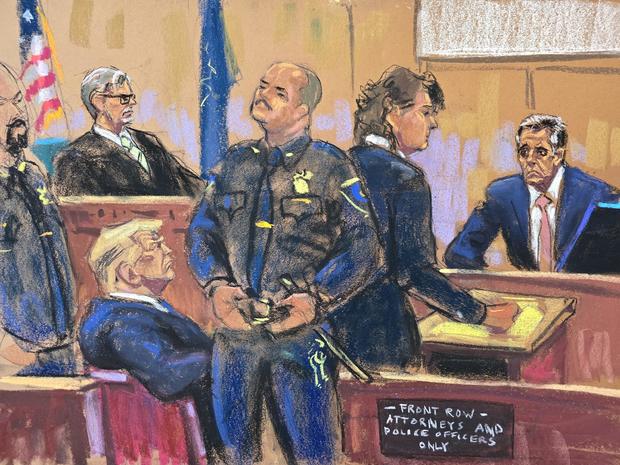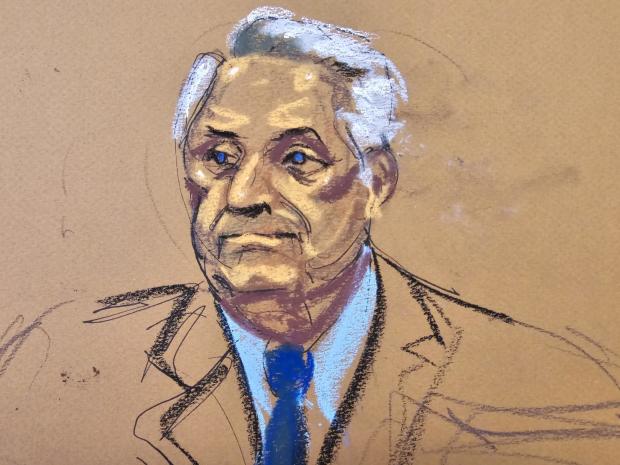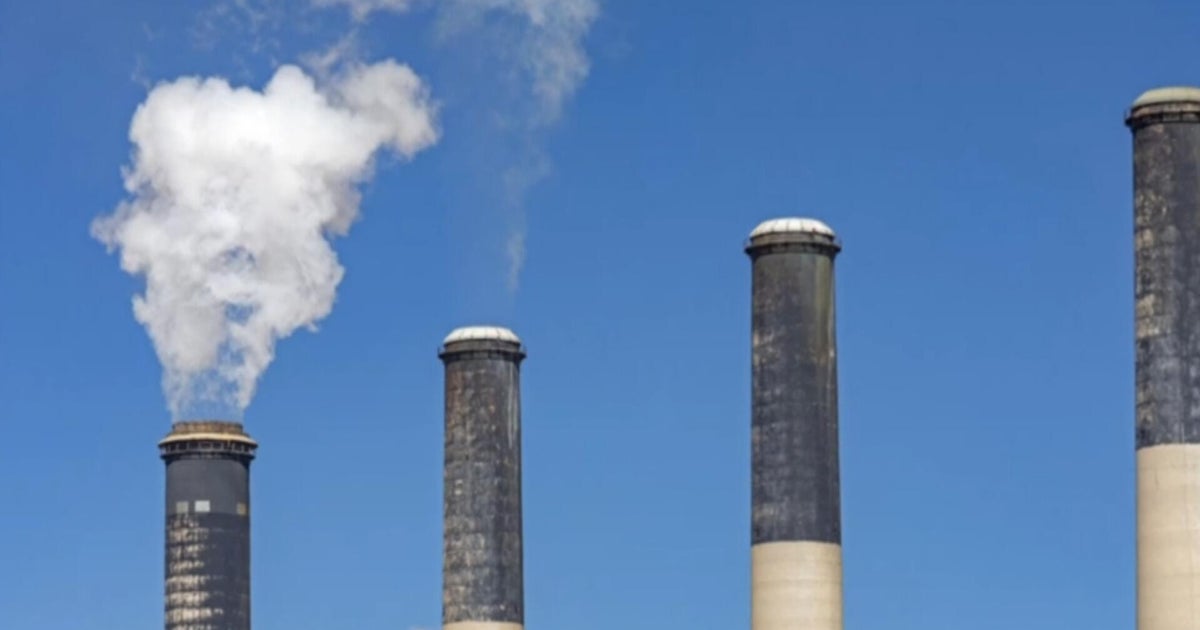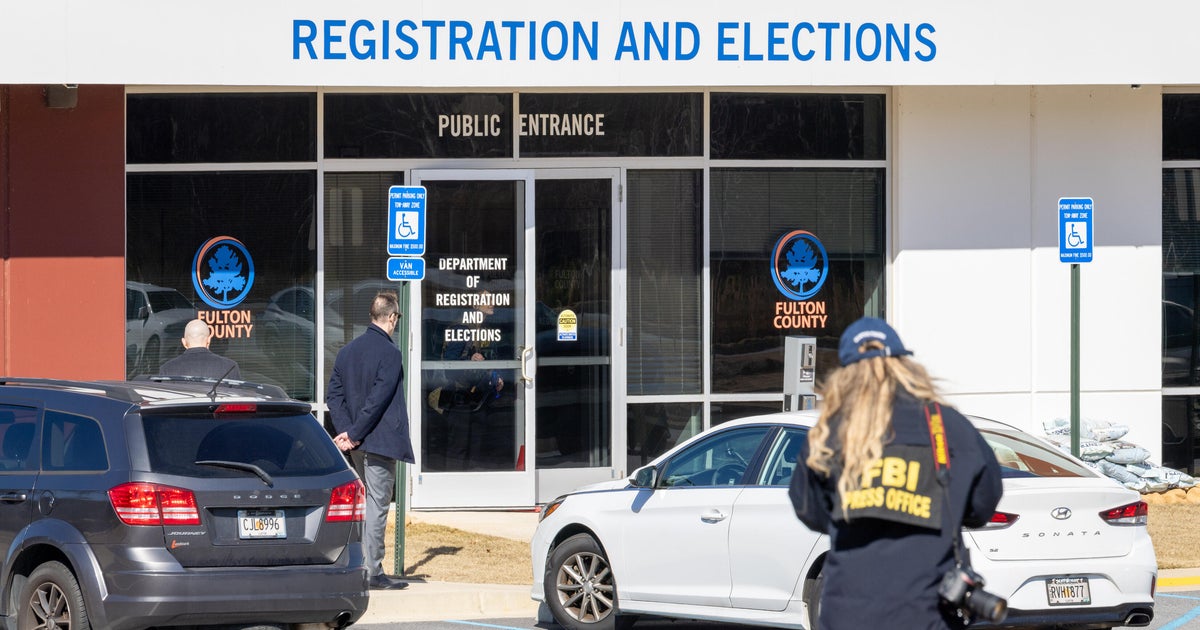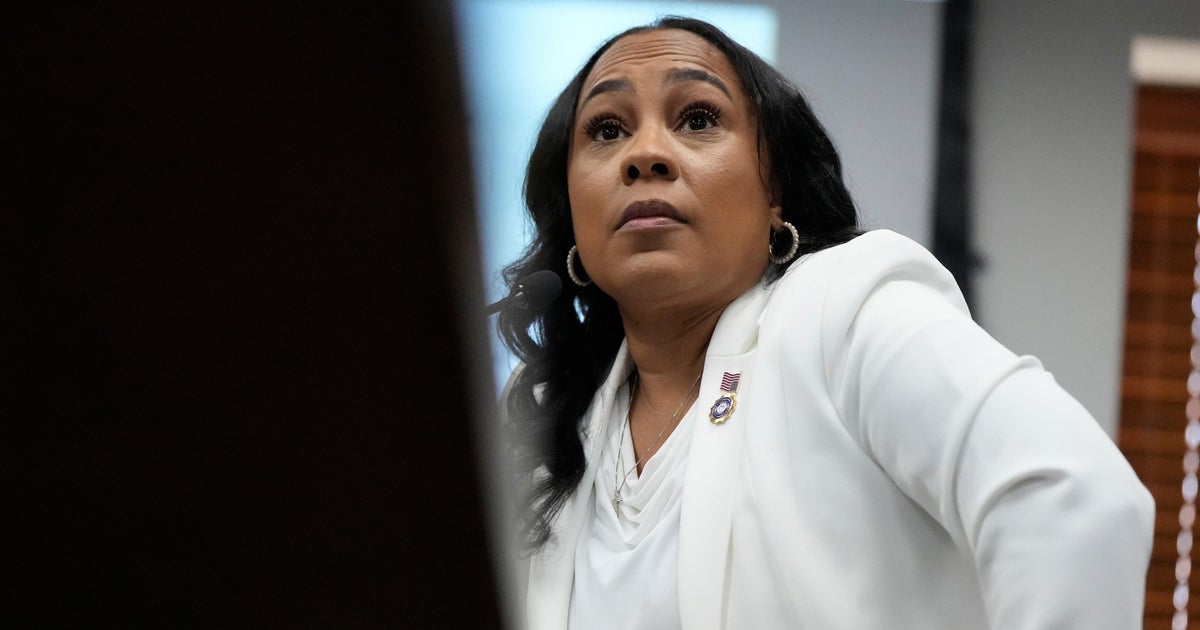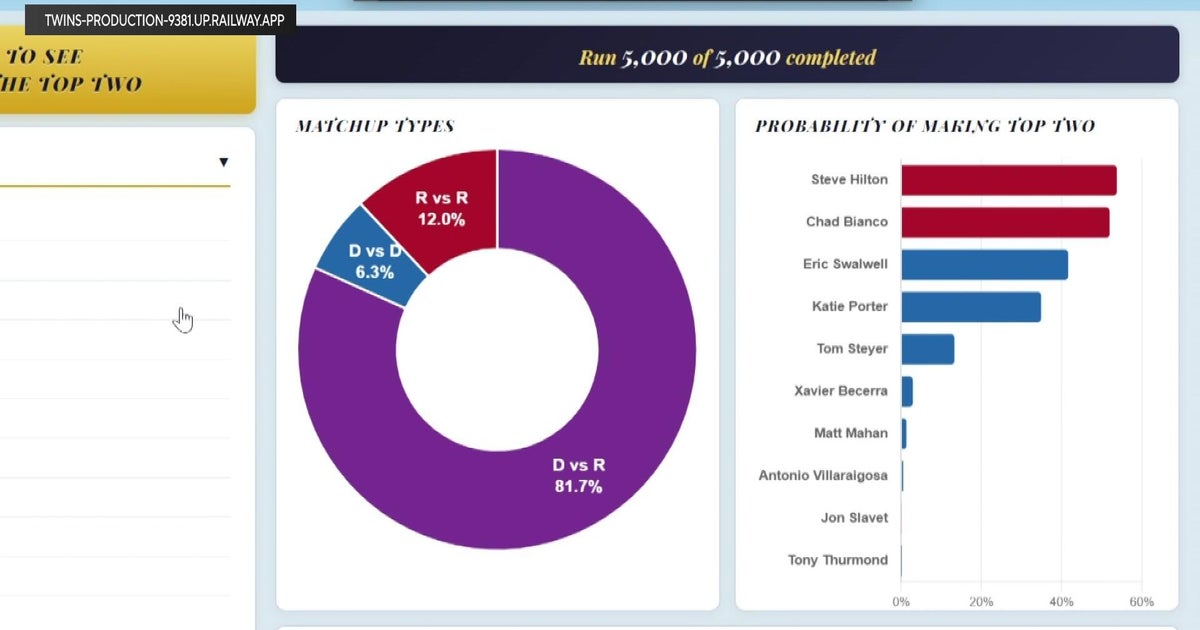Defense in Trump trial calls first witnesses during chaotic day in court
Prosecutors in former President Donald Trump's trial rested their case on Monday after a chaotic fourth day of testimony by Michael Cohen, whose turn on the stand came to an end as Trump's defense team began calling their own witnesses.
Jurors soon heard from Robert Costello, a lawyer whose testimony quickly sprinted past Cohen's in terms of acrimony, leading the judge to clear the courtroom in anger.
In an extraordinary confrontation toward the end of the day, Justice Juan Merchan severely admonished Costello for interjecting and rolling his eyes. "Are you staring me down?" Merchan asked the witness in a raised voice before suddenly shouting for everyone to leave.
Costello had been a focus of both sides' examination of Cohen. He billed himself as a "back channel" for Cohen after the FBI raided Cohen's home and office in 2018. He claimed Cohen told him that Trump "knew nothing" about the "hush money" payment at the heart of the case.
Over the course of the morning and early afternoon, Cohen faced one last barrage from Trump attorney Todd Blanche, who once again attacked Cohen's credibility, motivations and general truthfulness. Portraying Cohen as motivated by greed and willing to lie when it suits him, Blanche got Cohen to admit to stealing $30,000 from a tech company in 2017, and reminded the jury about his history of false testimony under oath.
Cohen is the only person who has testified that Trump had personal knowledge of an alleged scheme to falsify business records to cover up reimbursements for the $130,000 "hush money" payment Cohen made to adult film star Stormy Daniels before the 2016 election. Trump is charged with 34 felony counts and has pleaded not guilty.
Costello will return to the stand on Tuesday. Merchan said that both sides should prepare to begin closing arguments next week. He previously hoped to begin wrapping up the case this week, but he must still resolve a handful of outstanding issues before the jury can begin deliberations.
Here's how Monday unfolded inside the courtroom:
Judge skeptical of allowing email about Cohen's meeting with attorney
Prosecutors said Blanche, Trump's lead attorney, advised them that he would seek to admit into evidence an email regarding a meeting between Cohen and Robert Costello, an attorney who met with Cohen in 2018 about possibly representing him. Cohen testified that he didn't trust Costello, and thought he was trying to establish a "back channel" to Trump and Rudy Giuliani.
Costello's law partner wrote to Cohen and referenced the meeting, saying they were "very pleased with the discussion." Blanche said the email was a "direct impeachment to what Mr. Cohen testified."
Prosecutors said it was hearsay and shouldn't be admitted, noting that Cohen never replied to the email. Merchan seemed to agree.
"At this point, at this moment, I'm not going to allow it in," the judge said. "It doesn't express the opinion of Mr. Cohen, I don't think you can impeach him on this."
Judge says trial will go into next week
Kicking off the day, Merchan said a number of outstanding issues means the trial will continue next week. He had said earlier that both sides might be able to begin presenting their summations, or closing arguments, as early as tomorrow.
"It's become apparent that we'll not be able to sum up tomorrow," he said. Instead, the parties should be prepared to begin summations next Tuesday. The court is off on Friday and Monday for the Memorial Day holiday.
Merchan has said he didn't want a lengthy break between summations and jury deliberations.
"It was either have a long break now, or have a long break then, and unfortunately, the calendar is what it is," he said.
Attorneys for both sides then began arguing over the admissibility of evidence that Trump's team wants to introduce.
Early start to first day of week six
Trump trial proceedings typically kick off at 9:30 a.m., but the judge ordered an 8:45 gavel for Monday.
Two sides will be arguing over objections related to possible upcoming exhibits, and Merchan has elected to hear the debate before the jury arrives. The idea is twofold: to not waste the jury's time, and to keep things moving toward closing arguments.
Cohen called back to the stand
Cohen has been called back to the stand for his fourth day of testimony. On Thursday, Trump attorney Todd Blanche said he had about an hour's worth of additional questions planned for Cohen.
Prosecutor Susan Hoffinger said she might need about the same amount of time for questions on redirect.
After Cohen is dismissed, the prosecution will rest.
Cohen fields questions about preparing for testimony
Blanche began by asking Cohen about his contacts with reporters, prosecutors and others regarding his trial testimony and an earlier appearance before Congress.
Blanche asked Cohen if he had spoken to any reporters about what happened in court last week. Cohen said he didn't: "I spoke to reporters to say hello, how I'm doing, but I didn't speak about what happened last week."
Trump's attorney then asked how many times Cohen has met with prosecutors in the case. Cohen acknowledged it was "probably closer to 20," with some meetings lasting more than two hours. The last time he met with them was about 10 days ago, he said.
Cohen said some of the questions prosecutors asked him on the stand had come up in their preparation sessions, but noted that "there were many questions I had not heard before."
Blanche also asked him whether he had met with Dan Goldman about his congressional testimony in 2019, where Cohen has admitted he lied. Goldman, now a member of Congress, was previously the head of investigations for the House Intelligence Committee and a key member of the legal team for House Democrats when they pursued Trump's first impeachment. Cohen said he met with him twice about his testimony before the House Oversight Committee.
Cohen admits stealing $30,000 that was meant to pay tech firm
In 2014 and 2015, Cohen hired a small tech firm known as RedFinch to rig online polls to show Trump in a more favorable light. RedFinch was supposed to receive $50,000 for that and other work.
Instead, Cohen testified that he met with the owner of RedFinch and paid him $20,000 in cash in a small brown paper bag. (Previous reports have put the figure at between $12,000 and $13,000. Cohen said he didn't remember if it was exactly $20,000.)
In early 2017, when Cohen invoiced the Trump Organization for what he says was reimbursement for the Stormy Daniels payment, he included $50,000 for "tech services," a reference to the money the company owed RedFinch. The amount was doubled to cover taxes and paid out in the year's worth of checks Cohen would receive.
Cohen never paid RedFinch the difference.
"So you stole from the Trump Organization, right?" Blanche asked Cohen on the stand.
"Yes, sir," Cohen admitted, saying he told multiple prosecutors the story.
"Have you ever had to plead guilty to larceny?" Blanche asked.
"No, sir," Cohen replied.
"Have you ever had to pay back the Trump Organization the money that you stole from them?"
"No, sir."
Cohen's work for Trump family comes into focus
Trump's lawyer has been asking Cohen about the work he did for Trump and members of his family when he worked for the former president. Cohen testified that helping Trump's family members with an "array of legal issues" had always been a part of his job.
Specifically, Cohen admitted that he looked at an agreement from Madame Tussauds for first lady Melania Trump. He also said he helped Trump's daughter, Tiffany, with a potential extortion attempt that involved photos.
"Do you recall her communicating with you about concerns about someone trying to blackmail her?" Blanche asked about Tiffany.
"Yes, sir," Cohen answered.
Cohen says he made $4 million consulting in 2017
Blanche turned to Cohen's work consulting various clients during Trump's first year in office. Cohen said he had six clients who paid him roughly $4 million in total during 2017.
He said AT&T paid him $50,000 a month for a year for "consulting and advisory work," including on the company's bid to buy TimeWarner.
"So over the course of a year, you had 20 communications with AT&T, and they paid you $600,000," Blanche said.
Cohen also said he did work for the investment firm Columbus Nova, which had ties to a Russian oligarch. Cohen said the company paid him $80,000 a month for six months.
Other clients included Novartis ($100,000 a month), Korea Aerospace ($100,000 a month) and BTA Bank, based in Kazakhstan ($150,000 a month).
Trump lawyer turns to Cohen's talks with Costello
Blanche moved on to ask Cohen about his discussions with Robert Costello, the lawyer who Cohen spoke to in the spring of 2018 after his home and office were raided by FBI agents. Cohen testified earlier that he never trusted Costello and thought he was trying to establish a "back channel" to Trump and Rudy Giuliani, at the time Trump's newly named personal lawyer.
On April 23, one week after meeting with Costello and his law partner Jeffrey Citron, Costello emailed Cohen and said he "spoke with the person you asked me to" about why federal prosecutors in New York were investigating him. On the stand, Cohen said the person was Giuliani.
"You asked Mr. Costello to find out from Mr. Giuliani why the case was in [the Southern District of New York] and who approved it?" Blanche asked.
"Correct," Cohen said, adding that he didn't know why he was being searched.
Blanche asked Cohen if he would be surprised to learn that he and Costello spoke on the phone 75 times, for a total of more than nine hours. Cohen said the figure "seems excessive" but was "possible."
Trump's lawyer showed several emails between Costello and Cohen over the following weeks, with references to Costello speaking to Giuliani. In one email from June, Costello said he had met with "my friend" and expressed Cohen's "concerns." Cohen replied, "Not sure what concerns other than non-payment I expressed to you," an apparent reference to Cohen's desire to have Trump pay Costello's legal fees if Cohen hired him.
"You wanted Mr. Costello in June 2018 to communicate to Mr. Giuliani that the non-payment was becoming an issue," Blanche said. "And to let Mr. Giuliani know to pass it along to President Trump that it was becoming an issue."
"To keep him advised, yes, sir," Cohen replied, saying he didn't recall whether he asked Costello to reach out to Giuliani.
"This is late June. Was this around the time that your relationship with Mr. Costello and his firm ended?" Blanche asked.
"Yes, sir," Cohen said.
Cohen says TV show "The Fixer" hasn't been picked up
Blanche asked Costello about how he's made money since emerging from prison as a prominent Trump critic.
Cohen, who has frequently glanced over to the jury throughout the morning, said he's made $3.4 million from two books and about $1 million from his podcast, including sales of related merchandise.
Blanche asked if Cohen is pitching a television show based on Cohen and his work. Cohen said he isn't, but a former staffer for his podcast is, with Cohen's permission. He said the staffer recently sent a crew to New York to shoot a teaser for the idea. Cohen said that he and the staffer worked on the idea for three months.
The show would be called "The Fixer," a reference to Cohen's nickname at the Trump Organization. The New York Post reported last month that it would be a reality show in which Cohen tries to "fix" various businesses.
"Has that been picked up?" Blanche asked.
"No, sir," Cohen replied.
Cohen testifies that he is mulling a run for Congress
Cohen testified that he is thinking about running for Congress, an idea he previously floated on his TikTok account.
He admitted to saying that one of the reasons he should run for Congress is because he has some of the "best name recognition out there."
Cohen said his familiarity stems from the "journey" he has been on, but Blanche sought to tie Cohen's ongoing attacks on Trump as a part of that journey and thus why he is well-known.
"My journey is to tell my story," said Cohen.
Cohen says Trump being acquitted would be better for him financially
Continuing his theme of portraying Cohen as motivated by money, Blanche asked him if he had a financial stake in the outcome of the trial.
"Do you have a financial interest in the outcome of this case?" Blanche asked.
"Yes, sir," Cohen answered, noting that he makes money by commenting on his podcast and TikTok account.
"Because if President Trump is convicted that would benefit you personally and financially, right?" Blanche said
"No, sir," Cohen replied. "It's better if he's not for me, because it gives me more to talk about in the future."
Cohen says he would lie out of loyalty
Cohen testified that he would lie out of loyalty and said that he did so when previously testifying to Congress.
The admission came in a back-and-forth between Cohen and Blanche leading up to the final moments of the cross-examination.
"When you lied to Congress, you said you were lying out of loyalty, correct?" Blanche said.
"Yes, sir," Cohen replied.
"My question to you is, just restating that it's true that you will lie out of loyalty, correct?" Blanche asked.
"Yes, sir," Cohen answered.
Trump appeared to be comfortable as he watched this from the defense table, sitting back in his seat with one arm propped up on his chair.
Blanche then turned the questioning over to prosecutor Susan Hoffinger. Hoffinger, on redirect, asked Cohen if he lied in 2019 testifying to Congress. He said no, but testified that he did lie in his 2017 testimony.
Cohen explains how tech firm rigged online poll for Trump, and why he stole $30,000
The prosecution returned to Cohen's testimony about skimming $30,000 off a payment meant for the tech firm RedFinch.
Cohen elaborated on the work that the company did for him. In 2014, CNBC ran an online poll asking readers to vote for the top businessmen in the country.
"Mr. Trump's name was on that list, and at the beginning of this poll he was polling toward the very, very bottom and it upset him, and so he had me come to his office," Cohen said. "He provided me with a sheet of paper that showed it."
Cohen said he reached out to RedFinch's owner, John Gauger, who told him he could craft a program to vote repeatedly for Trump, using different IP addresses to avoid detection.
Cohen said he told Trump about what RedFinch could do, and they discussed what place he should finish in the poll.
"He, of course, wanted to be No. 1, but we didn't think that was a good idea, because it would raise red flags," Cohen remembered. "As long as we were top 10 we would go into another round."
Cohen said he told Gauger to move forward. When the poll ended, Trump was ranked No. 9.
But then Trump refused to pay RedFinch, Cohen said: "CNBC ended up not continuing and moving forward with this poll, and so he didn't feel that he had gotten the benefit of what the services were ultimately supposed to provide."
After the bill languished for months, Cohen said he felt pressure to pay Gauger, whom he considered a friend. That's when he gave him roughly $20,000 in cash, out of the $50,000 he was owed, Cohen said. He noted the money came from his own pocket.
Hoffinger asked why Cohen sought the full $50,000 in the invoice to the Trump Organization in 2017. Cohen said he was angry that his year-end bonus had been cut.
"I was angered because of the reduction of the bonus, and so I just felt like it was almost like self help," he testified. "I had protected [Trump] the best that I could, and I also had laid out money to RedFinch a year and a half earlier, and again $130,000, and to have my bonus cut by two-thirds was upsetting to say the least."
The final total Cohen would receive over the course of 2017 included $60,000 to make up for the cut to his bonus.
Prosecution tries to refocus Cohen testimony toward bolstering its case
Prosecutor Susan Hoffinger sought to address point-by-point many of the key attacks on Cohen's credibility Monday, but she also used redirect to buttress the state's case against Trump.
Is Cohen sure that he remembers speaking with Trump on the phone about the Daniels deal on Oct. 24, 2016, even if he can't recall talking about other matters?
"Yes, ma'am," Cohen said.
Did he ever send the Trump Organization or its former chief financial officer Allen Weisselberg a retainer agreement for the year of 2017?
"No, ma'am," Cohen said. "Because there was no legal work that I was to be paid for."
Later, Hoffinger turned to a letter Cohen filed in 2018 with the Federal Election Commission. He wrote that the Daniels payment "does not constitute a campaign expenditure or contribution."
Was that truthful?
"No, ma'am," Cohen said, prompting Merchan to remind the jury that they can't consider Cohen's guilt in that case as evidence of Trump's guilt in this one.
Hoffinger then pulled up for a second time a text message to Cohen from Jay Sekulow, Trump's then-attorney, after the statement was made: "Client says thank you for what you do."
Hoffinger asked Cohen if the circumstances of the non-disclosure agreement with Daniels — paid for by Cohen, allegedly reimbursed by Trump and allegedly done to influence the election — meant that it was legal, in his opinion.
"No, ma'am," Cohen said.
Hoffinger then pulled up a declaration Cohen made ahead of his guilty plea in his own federal criminal case. He wrote that he never signed a retainer agreement with Costello, the attorney who has long sought to undermine Cohen's story, and waived any attorney-client privilege from conversations they had.
Finally, Hoffinger turned to a phone call Cohen made to former Trump bodyguard Keith Schiller on Oct. 24.
Cohen initially testified that he asked Schiller to put Trump on the phone, and updated him about progress in the Daniels deal. Under cross-examination by Blanche on May 16, Cohen acknowledged that he spoke to Schiller about prank calls from a 14-year-old, but insisted he also spoke to Trump.
Hoffinger sought to introduce as evidence a photo that she said was taken just five minutes before the call, showing Trump and Schiller together.
Blanche objected to the photo and the judge has not yet ruled on its admissibility.
Court resumes after lunch break
Court has resumed after a lunch break. Cohen isn't back on the stand yet and the jury has not been seated. Merchan is going through the process of determining whether or not a photo presented by the prosecution will be allowed into evidence.
Transcript of morning sidebar reveals discussion over potential defense witnesses
The transcript of a sidebar from this morning reveals the defense's thoughts on its possible witnesses.
Blanche said Trump's team is considering calling former FEC Commissioner Bradley Smith, Robert Costello and its own paralegal "to put in one phone chart, which is very quick."
Smith is limited in what he can testify about, having been forbidden from giving his opinions or interpretations of the law.
Costello told CBS News last week that he was recently contacted by Blanche, but had not been told one way or another whether he'd be a witness. He was brought up repeatedly while Cohen was questioned, having served — in his own words via an email shown as an exhibit — as a "back channel" to Trump, via Rudy Giuliani.
A portion of the sidebar was sealed. The part that was not did not include any discussion of whether Trump might testify in his own defense.
Prosecutors say they want to call one more witness after Cohen
Joshua Steinglass, from the Manhattan District Attorney's Office, told the judge that prosecutors are hoping to call back a witness who testified earlier in the trial: a C-SPAN employee who could testify to the veracity of footage showing Trump and his bodyguard Keith Schiller together shortly before a crucial phone call between Schiller and Cohen.
Cohen testified that he discussed the Daniels payment with Trump on that call, while the defense suggested that it was about something else. The judge declined to allow an image of Trump and Schiller together to be shown to the jury.
Steinglass said they hoped to call the witness to the stand Tuesday morning, which would allow them to admit the footage. Steinglass said prosecutors only learned about the footage over the weekend, and said it would preempt any argument that Trump and Schiller weren't together at the time.
Blanche objected to recalling the witness, saying it was "patently unfair" and suggesting that the defense was prepared to rest soon after prosecutors conclude their case. He said he has a witness lined up in the back, ready to testify. He also said the defense could rest today as well.
Merchan said there is "no prejudice to anyone that I can see" by allowing the prosecution's witness to take the stand Tuesday morning, since they already decided this morning to essentially give the jury a week off before closing arguments and deliberation.
Judge allows photo into evidence, eliminating need to recall witness
To resolve the dispute over the C-SPAN footage and whether prosecutors would need to call back an earlier witness, Merchan allowed the admission of the screenshot of the video showing Trump and Schiller together shortly before the call with Cohen.
Hoffinger asked Cohen a series of questions about his conversations with Trump about the Daniels payment. He said he discussed the matter with him more than 20 times in October 2016, and said he had "no doubt" that Trump gave final approval to make the deal.
Cohen testifies that Trump often told him "I hate the fact that we did it" regarding "hush money" payment
The prosecution played a recording of a phone conversation between Cohen and Keith Davidson, who represented Daniels in negotiations.
"And I can't even tell you how many times he said to me, 'I hate the fact that we did it,'" Cohen is heard saying on the recording. He testified that he was referring to Trump and the payment to Daniels.
On the call, Cohen asks Davidson what he would do if he was in his position.
"I mean, would you write a book, break away from the entire Trump — we'll call it doctrine. Would you go completely rogue, join with Bannon? Any thoughts? Because it's not just me being affected, it's my entire family," Cohen asked.
He is also heard on the recording saying that he did it because he "care[s] about that guy."
Cohen testified that the recording was accurate and that the conversation came during a time when Cohen still represented Trump as his personal attorney.
Prosecution rests its case, with Cohen saying his life has been "turned upside down"
Wrapping up for the prosecution, Hoffinger asked Cohen a final series of questions.
"How has telling the truth affected your life?" asked Hoffinger.
"My entire life has been turned upside down as a direct result," said Cohen, sounding a little choked up. "I lost my law license, my businesses, my financial security."
The jurors closely watched Cohen as he spoke.
"Have there been attacks you've faced as a result?" said Hoffinger.
"Yes, maam," he said quietly.
"Have they been painful to you and your family?" she asked.
"Very much so," said Cohen.
After several more questions from Blanche, Steinglass said the prosecution was resting its case.
"Your honor, the people rest," he said.
Defense calls a legal analyst with Blanche's firm to the stand
Daniel Sitko, a legal analyst with Blanche Law who has been present at the trial throughout, was called to the stand for the defense.
He's introducing an exhibit he said he made on Friday. It's a chart showing phone calls between Cohen and Costello, and their length.
There were 75 calls in total, though some went unanswered. Six were longer than half an hour, Sitko said.
The longest was more than 96 minutes long on May 27, 2018, the Sunday before Memorial Day.
Prosecutor Rebecca Mangold pointed out that many of the calls were from the Costello's law firm offices, and were very short or not answered at all. In some instances they were logged as two calls but were actually one, along with a voicemail.
Sitko acknowledged that meant there were in fact fewer than 75 calls.
Defense calls attorney Robert Costello to the stand
After the legal analyst introduced the chart showing calls between Cohen and Costello, Trump's defense team called Costello himself to the stand.
In his testimony, Cohen alleged that Costello urged him not to turn against Trump in April 2018, after FBI agents searched Cohen's home and office.
Prosecutors immediately objected to Costello taking the stand, and he has not yet entered the courtroom.
Costello is sworn in as a witness
Merchan allowed Costello to be called to the witness stand for the defense, but limited what he can testify about.
The judge decided that Costello can speak about two instances in which Cohen said he could not recall interactions with Costello. He also granted the defense some latitude to explore a pressure campaign via "back channel" communications from Trump and Rudy Guiliani to Costello and then to Cohen.
Merchan added a caveat that he would not allow the testimony of Costello to become a "trial within a trial."
Costello says Cohen told him Trump "knew nothing" about Stormy Daniels payment
On April 9, 2018, FBI agents executed a search warrant on Cohen's home and law office in New York. The search came nearly two months after Cohen acknowledged paying Daniels and was the first indication that he was facing federal scrutiny.
Costello said he spoke with him soon after.
"He was absolutely manic," Costello recalled. "He kept on pacing back and forth, left and right."
He said Cohen told him, "My life is shattered, my family's life is shattered, I don't know what's going to happen."
Asked what he told Cohen, Costello said the matter would be resolved quickly if Cohen had the truth on his side.
"I swear to God, Bob, I don't have anything on Donald Trump," Costello claimed Cohen told him.
After several objections, Trump attorney Emil Bove told Costello: "I want to focus very narrowly on whether Cohen said Trump knew about the Stormy Daniels payment."
"Michael Cohen said numerous times that President Trump knew nothing about those payments. That he did this on his own," Costello testified. "He repeated this numerous times."
"Are you staring me down?": Judge clears the courtroom to severely admonish Costello
Minutes after he took the stand, Merchan severely admonished Costello over his behavior on the stand and ordered the courtroom cleared in an extremely rare move.
Costello said "geez" after prosecutors' objection to a defense question was sustained. He also made an exasperated "pfft" noise after another sustained objection.
"If you don't like my ruling, you don't say 'geez.' You don't say 'strike it.' Because I'm the only one who can strike testimony," Merchan told Costello. "If you don't like my ruling, you don't give me side eye and you don't roll your eyes. Do you understand that? Do you understand that?"
Costello stared at Merchan in response. Merchan asked in a raised voice, "Are you staring me down?" and suddenly shouted for everyone to clear the courtroom. The press and public were all hastily sent out, with guards shouting. One had his hand on his holster as he waved for reporters to get moving.
On the audio feed in a nearby overflow room, Costello could be heard asking Merchan, "Do you want the answer to the question?"
"Remain quiet," Merchan said.
Prior to this exchange, the judge told Costello not to answer when he sustains an objection. Many of the questions asked by Trump's lawyer were objected to and sustained, seemingly due to the limited scope of what Merchan allowed Costello to testify about.
Costello testifies that Cohen said he was suicidal when they first met
Once back on the witness stand, Costello testified that Cohen was suicidal when they first met at the Regency Hotel in New York on April 19, 2018. The FBI had searched Cohen's home and office 10 days before.
"He was suicidal that day and acting very manic," Costello said. He also acknowledged that Cohen was pacing back and forth.
"I didn't know him. He was putting on quite a show and he explained to us — he told us that two nights before, he was on the roof of the Regency Hotel and he was going to jump off and kill himself because he couldn't handle the pressure in what he saw coming his way," Costello testified.
Prosecutors asked Costello if, as a defense attorney with years of experience, he could understand and empathize with someone going through what Cohen had gone through. Costello answered yes.
Trump defense moves to dismiss charges as court concludes for the day
After Costello was dismissed from the stand for the day, Blanche said Trump's team was moving to dismiss the charges, claiming there is "no evidence" that business records were falsified and there was "no intent to defraud."
"There's no evidence that he had any intent to mislead or to falsify business records," Blanche said. He argued that prosecutors had not shown evidence of an underlying crime, a prerequisite for charging falsification of business records as a felony. He said there was no evidence that the alleged "catch and kill" scheme hatched by Cohen, Trump and David Pecker was illegal.
"There's simply no evidence of any criminal intent on any of the parties in 2016, 2017," Blanche argued. "For that reason, the court should render a verdict in favor of the defendant."
He concluded by saying "there is no way this case should go to the jury relying on Cohen's testimony" and that "without Cohen, there is no case."
Merchan asked if Blanche was suggesting the judge should take the matter "out of the jury's hands." Blanche said that he "absolutely" should.
"You said his lies are irrefutable. You think he is going to fool 12 New Yorkers into believing this lie?" Merchan asked.
For the prosecution, Matthew Colangelo said the evidence is "overwhelming" and shows the "intent to deceive government regulators."
Merchan reserved judgment on the matter and court was dismissed for the day.
